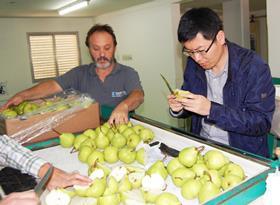
Argentina has sent its first consignment of pears to China following the signing last year of an import protocol between the two countries. According to a press release from the agriculture ministry, three containers carrying 63 tonnes of pears were shipped from the port of San Antonio Este in the Rio Negro region after being jointly inspected by Argentina’s plant health authority Senasa and the Chinese General Administration of Quality Supervision, Inspection and Quarantine (AQSIQ).
It follows a trial shipment of two containers, which was dispatched earlier this month to study how the fruit would withstand the cold treatment to which it must be subjected during transit under the terms of the protocol.
Government representative Javier Rodríguez said the move “represents a clear example of how public policy and the willingness of the government could translate into concrete actions that benefit the sector’s producers”.
Rodríguez added: “China is an important strategic partner and huge importer of foodstuffs with which we have established close trading links”.
Speaking after the earlier trial, Daniel Satragni of the Argentine Chamber of Integrated Fruit Growers (Cafi) told Rionegro.com.ar that although the prospects for topfruit in China were good, exports could be hampered by the fact that Argentina was subject to higher import tariffs than other Southern Hemisphere countries such as Chile, which pays an average tariff of 1 per cent compared to Argentina’s 30 per cent.
Pears are the latest food to have secured access to the Chinese market in the past two years, the others including apples and various meat and dairy products. Last week the agriculture ministry announced that progress had been made in opening the market for other products including table grapes and peas, for whch a number of inspection visits had already been made and the authorities were awaiting reports to finalise negotiations for the signing of the import protocols.
The products that can currently be shipped to China have a potential market value of US$11m according to the ministry.



